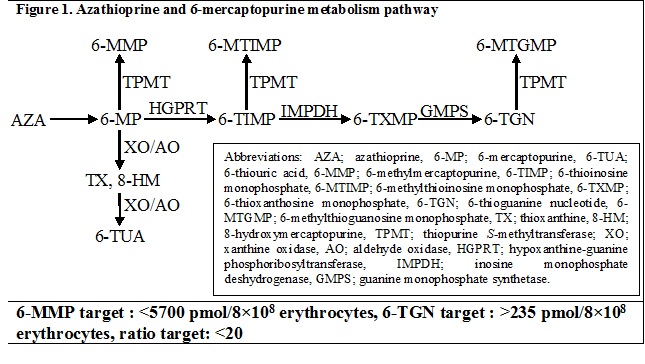Session Information
Session Type: ACR Poster Session C
Session Time: 9:00AM-11:00AM
Background/Purpose: Thiopurines are a mainstay for the treatment of autoimmune diseases. However, in inflammatory bowel diseases (IBD), 14-18 % of patients manifest a skewed metabolism of these drugs leading to an overproduction of the 6-methylmercaptopurine (6-MMP) metabolite to the detriment of the active 6-thioguanine (6-TGN) metabolite (Figure 1). These patients are identified as shunters. In IBD, allopurinol is used to reverse this skewed metabolism, thus preventing thiopurines resistance or hepatotoxicity. However, this strategy has hardly been studied in a population with other autoimmune systemic diseases.
Methods: Patients were identified using the central laboratory database and data were retrospectively collected. Clinical and laboratory evolution of patients for whom azathioprine (AZA) was optimized with a xanthine oxidase inhibitor (XOI) was assessed on a 12-month period.
Results: Thirty-four shunters (33%) were identified over 103 patients treated with AZA for autoimmune conditions other than IBD. Twenty shunters were not optimized while 14 shunters were optimized with allopurinol (13) and febuxostat (1). Multiple reasons lead to optimization: 6 patients were depending on corticosteroids, 6 patients were non-responsive to therapy or had a relapse, 3 patients had hepatotoxicity and 3 patients were optimized solely based on their metabolites ratio. The maximal AZA dose decreased form 2.07 mg/kg (interquartile range (IQR): 1.77-2.45) on AZA alone to 0.86 mg/kg (IQR: 0.68-1.07) on AZA-XOI combination therapy. Despite this significant 58% (p=0.003) dose reduction, optimization with a XOI allowed to increase the 6-TGN blood level from 135 pmol/8×108 red blood cells (RBC) (IQR: 91-199) to 385 pmol/8×108 RBC (IQR: 237-449) (p=0.001) and to decrease the 6-MMP level from 6267 pmol/8×108 RBC (IQR: 3858-11306) to 271 pmol/8×108 RBC (IQR: 162-528) (p=0.001). All patients resumed a normal 6MMP/6TG ratio (<20) and 2 out of 3 hepatotoxicity resolved. Except for the mean corpuscular volume increase of 12% (p=0.001), the changes in the blood count were not considered clinically significant. Notable infections were reported in 3 patients. After 6 months of optimization, prednisone was reduced by 89% (p=0.005), 12 patients were in remission and 2 in partial remission.
Conclusion: In this retrospective study, the optimization of thiopurines with a XOI was safe and effective. This strategy represents a promising therapeutic option in patients with autoimmune systemic diseases.
To cite this abstract in AMA style:
Belhocine M, Chapdelaine A, Doré M, Troyanov Y, Mansour AM. Optimization of Thiopurines with a Xanthine Oxidase Inhibitor in Patients with Autoimmune Systemic Diseases [abstract]. Arthritis Rheumatol. 2016; 68 (suppl 10). https://acrabstracts.org/abstract/optimization-of-thiopurines-with-a-xanthine-oxidase-inhibitor-in-patients-with-autoimmune-systemic-diseases/. Accessed .« Back to 2016 ACR/ARHP Annual Meeting
ACR Meeting Abstracts - https://acrabstracts.org/abstract/optimization-of-thiopurines-with-a-xanthine-oxidase-inhibitor-in-patients-with-autoimmune-systemic-diseases/

